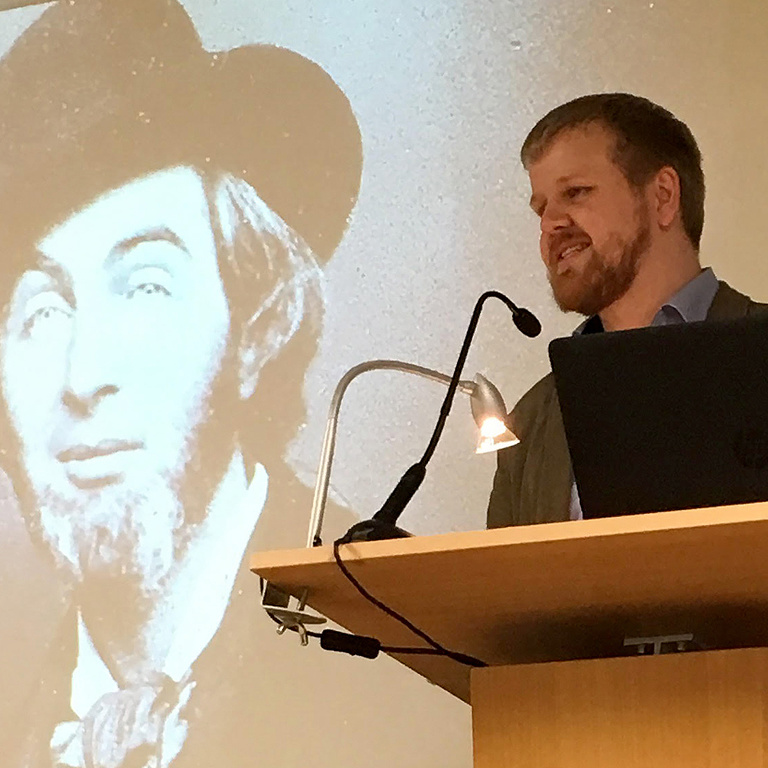Stefan Schoeberlein
Stefan Schoeberlein, a Ph.D. student in English, is currently completing his dissertation titled, “Cerebral Imaginaries—Brains and Literature in the Transatlantic Sphere, 1800-1870.”
Schoeberlein’s research focuses on one of the areas poets, novelists, and scientists of the times debated quite fruitfully: the brain.
Schoeberlein has already established himself as a highly productive scholar, having published seven articles in prominent journals, with six more accepted for publication. According to his dissertation committee, his publication record, in all likelihood, is unmatched in the history of the English doctoral program.
Q: Why did you pursue graduate school/become a researcher?
A: The idea of pursuing a Ph.D. actually never crossed my mind until coming to the University of Iowa during an academic exchange in 2011. I was pursuing a Master’s degree in special education in Germany then, but had long harbored a love for Walt Whitman—and I was fortunate enough to have the opportunity to partake in Dr. Ed Folsom’s Whitman Seminar here. Then I was hooked and knew that’s what I wanted to do. So I finished my Master’s and came right back to Iowa.
Q: Describe your research in non-expert language?
A: Broadly speaking, I’m fascinated by how science and literature engaged with each other in the nineteenth century. It has almost become normal today to consider these two spheres as fundamentally different, but in the 1800s that was not the case. In a time when modern psychology did not yet exist and philosophical or religious theories of mind were losing in the marketplace of ideas, writers debated in tandem with early neurologists what it meant to think of oneself as a “brain.” Emily Dickinson created anatomically precise verses about lobes, hemispheres, and cranial tissue; Edgar Allan Poe fictionalized one of the first cases of the insanity defense; and Charles Dickens narrated the precise effects of brain damage on personality. My research looks at the various exchanges between anatomists and writers of literature in the 1800s and asks: Why did all of these authors suddenly turn towards the brain? And how did this affect their writing?
Q: What impact has your work had on the field/world? What impact do you hope to have on your field/world?
A: Psychological criticism has a long tradition in the field of literary studies, from now somewhat arcane, Freudian ideas to modern cognitive theories of reading and writing. Still, the psychology of the particular period I am interested in has remained somewhat overlooked. Between 1800 and 1870, brain-centric theories dominated the discussion around what the mind is and how it functioned, perhaps in a manner quite similar to today (though the theories themselves were different). Still, when analyzing psychological depth, notions of selfhood, or descriptions of cognitive processes in works of literature of that time, there is still a tendency to either look back to philosophical theories of the late 1700s or jump ahead to concepts from modern psychology. My goal as a literary historicist is to reintroduce some of the early cognitive theorists and anatomists into the discussion of nineteenth century literature—some of whom were quite accomplished writers in their own right.
Q: What programs or resources (on or off campus) have influenced or supported your academic goals?
A: One of the authors I keep returning to in my work is Walt Whitman. The University of Iowa co-hosts one of the prime resources for any scholar of Whitman—the Walt Whitman Archive—and I was fortunate enough to be able to work as a research assistant for it. Engaging both with the computational end of translating Whitman’s personal documents into an online resource, as well as diving deep into the plethora of information available on him, has been an incredibly fruitful academic experience that was absolutely crucial to my development as a researcher and writer.
Q: Do you have any role models, mentors, or inspirational people who have encouraged you to pursue your work?
Each member of my thesis committee has had a fundamental impact on the development of my academic interests, my writing, and my theoretical outlook, and I cannot thank them enough for their guidance and support. I owe a debt of gratitude to Ed Folsom and Garrett Stewart, whose intellectual generosity and scholarly rigor I can only hope to be able to mimic one day.
Q: How has your graduate experience shaped your career goals?
A: While graduate school certainly offers a plethora of, at times surprising, sources of anxiety, looking back it made me more secure in my research and my ability to talk about it. Coming here with rather nebulous ideas about what constitutes scholarship (as a first-generation college student), I now think I have a somewhat firmer grasp of my abilities, a much clearer understanding of my scholarly interests, and enough experience to maneuver conferences and presentations with only a healthy degree of self-doubt.
Q: If you could go back to a time at the beginning of your graduate career, what advice would you give yourself?
A: I was lucky enough to have someone tell me this in my first days in graduate school, but I would probably remind myself to “fail productively.” While getting criticized, especially by anonymous peer-reviewers, always stings, learning to deal with it economically might be one of the best things to pick up early in graduate school. One’s personal emotional expenditure over criticism should not take up significantly more time than it took the person putting it forth to reach his/her conclusion.
